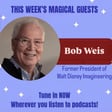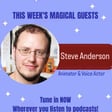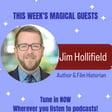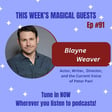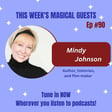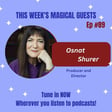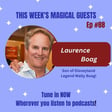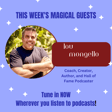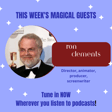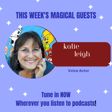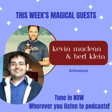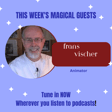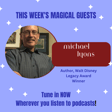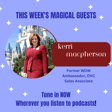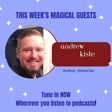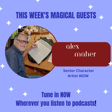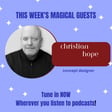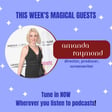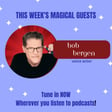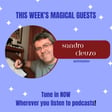Become a Creator today!Start creating today - Share your story with the world!
Start for free
00:00:00
00:00:01

Episode 78: Paul Osterhout
Join us this week as we sit down and chat with former VP of Disney Imagineering and Universal Creative, Paul Osterhout!
DISCLAIMER: We are not an affiliate of the Walt Disney Company nor do we speak for the brand or the company. Any and all Disney-owned audio, characters, and likenesses are their property and theirs alone.
Recommended
Transcript
Introduction and Purpose
00:00:01
Speaker
Welcome to Sharing the Magic, the podcast that takes you on a journey through the enchanting worlds of Disney. Each week, we're joined by a special guest, whether they're a magician creating moments of astonishment or a Disney expert sharing the secrets behind the magic of the happiest place on Earth. Together we'll uncover the stories, inspirations, and behind-the-scenes tales that bring these worlds to life.
00:00:32
Speaker
So, get ready to be spellbound and transported to a place where dreams come true.
Meet the Hosts and Guests
00:00:53
Speaker
right ladies and gentlemen welcome to another wonderful edition of the sharing the magic podcast i am your wonderful host james kemp this evening and we have a great guest that i'm not going to dive too much into i'm just excited to talk to i'm gonna let the rest of the cast be excited for what's to come uh we'll introduce our guests at the end of it i'm gonna start with lisa though let's let's introduce what our first cast make tonight lisa how are you doing this this evening Hi, everyone. I am great.
00:01:22
Speaker
um It's balmy 30 degrees here in Indianapolis, but I have my background. I know that all of our listeners cannot see, but sunny Florida. So I was trying to think warm.
00:01:35
Speaker
um But yeah, I'm really excited. I have some great im Imagineering friends, and I always love to chat with Imagineers and those who've been in the business for a long, long time.
Holiday Preparations and Challenges
00:01:48
Speaker
Dawn, how are you doing? You're up next. are you doing this evening? Happy holidays, everybody. Yes, just ah busy trying to get food and bought and preparation preparations made and gift wrapping and all the stuff. My head's about to explode, actually.
00:02:06
Speaker
um Yes, so the holidays are frantic, but glad to be here. Happy to meet you. And in Houston today, it was it got up to like 70 degrees. So I was at my son's lacrosse game. It was really nice out.
00:02:19
Speaker
envious yes envious right now brian brian how are you doing this evening brian i'm freezing my behind off it's uh 23 degrees here in new jersey i don't know what the heck's going on but it's been miserably cold but i am just getting up for the holiday season getting ready and trying you i have two days to get things together and i i'm really behind so i've been traveling too much that i'm behind in my shopping but i got two days so i'm good And Jeff, the incomparable Jeff Shaver, he's back with us after a little bit of an absence. How you doing, bud? How you feeling?
00:02:53
Speaker
I'm feeling a little better. Okay, so Paul, I don't i don't know if you if you're like...
Paul's Disney Voice and Casting Stories
00:03:00
Speaker
here's Here's what I am. They call me the Goofy Doop. I love Goofy. You know, when we have a special guest, i always try to welcome them.
00:03:07
Speaker
My Goofy voice. my Goofy voice. All right. let's Let's hear it. ah struggle Yeah, I'm nervous. Oh, Gorsh. Oh, hey, tonight. you got a real special guest.
00:03:19
Speaker
yeah oh well please welcome me. Wendy Amazing. Paul Osterlamp. Oh, legendary. Oh, imagine there. and designer.
00:03:29
Speaker
who brought those mauler dreams to come true. Happy holiday. Oh, oh yeah Bravo, bravo, bravo, bravo. it was okay. I could do better.
00:03:43
Speaker
Second take would have been okay. No, but let's so let let's start on so let's start on voices, if we can. yes. Let's do that. Let's do that. Okay. yeah So let me let me take you back. we're going to tell a little story here. Yeah. And and this is, um and and I don't know if through if there's a, you want to try and do it a timeline or something, but I want to make sure that we tell this story while you're talking about voices. Awesome.
00:04:09
Speaker
ah Kevin Rafferty and I were doing New Tomorrowland in 83, Walt Disney World. And I know your audience is probably worldwide, but we're talking about Walt Disney World.
00:04:21
Speaker
And we were redoing the Carousel of Progress, um updating it, kind of, we're bringing the original song back. It's a Great be Beautiful Tomorrow, which had gone away.
00:04:33
Speaker
And we were casting the new big new cast and we had Gene Shepard, who was now the father. And we had other you know ah cast members. And we had trouble casting the teenage boy um who only appears in the last scene.
00:04:51
Speaker
um And he's ah having a video game thing with his grandma. And there's a joke happening about voice activation. And we we auditioned like a bunch of women and men, because like sometimes women will do ah ah a ah boy's voice, a Simpsons is a good example.
00:05:09
Speaker
yeah And i I went to Kevin and i said, Kevin, it needs to sound like this. Hey, grandma. And Kevin said, Paul, you need to do the voice. And then so it's like, okay so we went to Marty because, you know, when we try to insert ourselves in in the shows,
00:05:27
Speaker
Sometimes it can be gratuitous. And so Marty said, no, you should you should do the voice. So I did the voice. I am the voice of the teenage boy in Carousel of Progress. Oh, cool.
00:05:38
Speaker
So. cool now but he already Marty being Marty Scalar. Marty Scalar. Yeah, Marty Scalar. So. So now, um Kevin and.
00:05:50
Speaker
And the music director decide the last scene, everybody's going to do a chorus of It's a Great Be Beautiful Tomorrow, right? We got Gene Shepard doing one. By the way, we had a sound-alike doing Gene Shepard because he couldn't sing.
00:06:03
Speaker
But that's what's matter. And then we had mom and grandma. And then it gets to me, and the guys and at WDI i worked with me like probably a day to get my like my one line, right? Like one line.
00:06:17
Speaker
Yeah. but I can't sing. So I'm trying to sing the song, trying sing and trying to sing. And eventually, like in the evening, they go like, we got it.
00:06:28
Speaker
We got it. You're in. ah So now fast forward like two or three months later and we're we're doing a ah mix in this in the in in the show.
00:06:39
Speaker
we We do final mixes in the theater because we want the sound, to the the audience to hear the sound as clear and as best as possible. So we're going through, we finally get to the final scene and they go to the solos.
00:06:55
Speaker
One, two, three. And it gets to my solo and it goes back to the chorus again. Everybody's singing. And Kevin Rafferty is like two, three rows in front of me. I'm sitting in the back kind of like taking notes.
00:07:08
Speaker
And Kevin does this. but like but They cut me out without telling me because so because my performance was not up to. And it was like, I got it.
00:07:20
Speaker
But it was just like this funny moment of like, oh, God, he's here now. like no so if you So if you go to if you go to Carousel of Progress now and you'll hear my I do the I do the voice, obviously.
00:07:34
Speaker
But when it comes to the song, I'm out.
00:07:38
Speaker
That's a great story. There we go. Now we know. headstone Now you know the history about that. yeah I love stories that are a self-deprecating. They're my favorite because I'm sort of the same way. I'm like, well, there's this one time that I try to... I love... Those are my favorite. Self-deprecating stories are a little... They're my favorite. That was a good way to start out. That was so that was so good. yeah I love Carousel of Progress.
00:08:03
Speaker
i go I do that attraction every time I go. So there's other – I mean, there's – as you know, there's Easter eggs and there's hidden Mickeys and all that. So on the bulletin board where Mother's station was, Mother's workstation, ah my daughter was like two years old, and I had a picture of her, and I pinned that up there. And then Kevin Rafferty put – there's a note up there that says – from From Marty, please see me for changes in red ink, which is like typical Marty, you know, like he everything was in red ink. And so there's a lot of those Easter eggs that I don't think people knew about. And I think over the years, that's all been replaced now. But those are the things that we did, you know.
00:08:49
Speaker
without trying to Without trying to change a story, with you know, like we didn't do it gratuitously like, oh, I want to be in the show. it It made sense to the story. It was pure to the story. And I think that a lot that was important to certainly important to us and important to Marty's. Like, let's make sure that we're telling a singular story without getting ourselves into the middle of it.
00:09:15
Speaker
we You know, unnecessary. So. That's so awesome. And even to hear that a Marty Graham made the ride was even better. Oh, yeah. Yeah, it was like, you know, it was like Kevin kevin wrote it like, please see me for edits or something. Sign Marty. It was like, it was typical Marty.
00:09:34
Speaker
That's awesome. So we we that was a great way to start off the show, I'd say, with a story like that. But we we usually ask to start out, what started you in Disney?
Paul's Journey and Return to Disney
00:09:44
Speaker
What got you, you know, what what drove your love for Disney?
00:09:47
Speaker
Yeah, okay. So this This could probably take 30 minutes to tell this whole story, but as ah as a youngster, I liked to do magic. right it was like and And like ah any 11-year-old boy who likes to do magic, I kind of never grew out of it.
00:10:05
Speaker
um But i was not I'm an introvert normally. And so I was never thought of myself as a performer, you know being on on on the stage. But I liked the idea of magic. I liked fabricating magic things.
00:10:20
Speaker
And so I was working at um ah ro but let let's say it's a roadside attraction, but it was called the Mystery Funhouse. And I was hanging out in the magic shop. They had a magic shop there.
00:10:31
Speaker
And the project manager was there who was putting in a new display. they were They were adding to the display. And they were looking for people that could sculpt um for this new display. And I said, but I can do that. Because I i had built magic stuff. and And I said, I could do that.
00:10:48
Speaker
And so i i from like midnight to 7 in the morning, I would go sculpt whatever they wanted. And then they liked what I did. And they said, well, and by the way, I was 18 years old at this time.
00:11:04
Speaker
They said, um well, we're we're going to go do our next job. It's at Daytona Beach. And we'll pay for your salary and we'll pay for you to live on the beach. And I'm going like, OK, so what's the downside here?
00:11:15
Speaker
So with that. And that was ah that was a project called Baron front Fred's Castle, which is no longer there. by the And then um they said, well, our our headquarters is in Los Angeles.
00:11:26
Speaker
And if you want to come to Los Angeles, there's a job for you. And, you know, at 18, 19 years old, it's like, well, OK, I'll go do that. And I did that with them for about two or three years.
00:11:39
Speaker
And they were they were going to go out of business. And the owner of the company said, well, there's this company called Wed. And they're doing this project for a thing called Epcot.
00:11:50
Speaker
Now, of course, I knew what Wed was because, you know, being in the industry, you kind of know what wet is. Had no idea what Epcot was. Called them up. Got hired a month later.
00:12:03
Speaker
And that was in January of 1980. I got hired into the model shop, which is kind of like the back then it was kind of like the starting point if you wanted to be in show design.
00:12:15
Speaker
Most everybody started in the model shop because then you and in the model shop, you get to touch people doing audio, video, lighting, show designers, and you got to understand how things come together, how a project or how ah an idea comes together.
00:12:32
Speaker
So i I got hired into the model shop, but I was assigned to prop making because I could make things. And I did that until 83. And then if you know the Disney history, you know, 83 was not a good great year. Disney was looking, people were looking to sit take Disney and pull it apart and sell the parts. and And luckily Roy Disney came in and saved it and brought Michael and Frank in.
00:13:00
Speaker
So from 83 to 87, I left in 83 and I worked for a company called a Cinnabar, which is a big non-union scene shop in Hollywood. And we they did.
00:13:14
Speaker
well let me tell you, in like three years, I did like 500 different commercials in three years. Oh, wow. In 80s, a good friend of mine. who I'd met at Disney, Joe Rohde.
00:13:27
Speaker
You may have heard his name. um We were good friends. Actually, he was the best man at my wedding. And he said, would you consider coming back to Disney? And i was like, yeah, of course. I have no problem with Disney.
00:13:39
Speaker
And so I assumed I was going to go back and work on Animal Kingdom because Joe was putting together a team for Animal Kingdom at the time. And when I got back, I think Bob Weiss and Steve Miller and all those other people saw that I had worked on television commercials and TV shows and movies.
00:13:56
Speaker
And they said, oh, he would be a good candidate for Disney MGM Studios. So in 87, I got back and i worked on Disney MGM Studios. I came back as a production designer and I was in charge of the AV theaters, which was Superstar Television and Monster Sound Show.
00:14:16
Speaker
And yeah, and then from there, just continued. And I can continue if you want, but that's how got. What was it like coming back? So here's, you know, we've all been in the job situation or, you know, sometimes you leave a job, you come back.
00:14:32
Speaker
What was it like when you came back? um Did you have, obviously, you you probably had a sort of a sense of renewal, um but I don't know. You know, sometimes I hear these kinds stories and I'm just curious, like,
00:14:46
Speaker
Yeah, I mean, when I left Disney in 83, obviously it wasn't my choice. and and And in any entertainment industry, it's cyclical. You go, we're busy, and then we're not busy. We're busy, we're not busy. right So i was I had no hard feelings to Disney.
00:15:05
Speaker
um So I came back, and was and by the way, when you leave the company and come back, more likely you come back at a much higher level. but Absolutely. And that was my question was like, when you came back, did it feel familiar? But it was sort of, you know, it's the hero's journey.
00:15:21
Speaker
That's sort of the thing I was thinking of. It's like, yeah. So when I came back, I was no longer working in the shop. yeah I was no longer getting sawdust on me. I was directing people to to do what I felt.
00:15:35
Speaker
And and and that's that's one of the skills I picked up at Cinnabar is that I worked myself out from actually cutting wood and, and, and gluing things to being kind of a leader, you know, a job, a master.
00:15:53
Speaker
And so I was able to transfer that to Disney and, the and I don't know that would be right to say they took a chance on me. I think they, they knew what I could do. And, um,
00:16:05
Speaker
Yeah, so it was like, it was, I'm going to say seamless. It was like, I'm just stepping in and I know what the job is because I knew Disney culture, but I also knew what they were looking for.
00:16:19
Speaker
it was just kind of like, well, let's go with this. um Yeah. and And the other thing about, and by the way, it wasn't WED anymore. It was now WDI because when Michael and Frank get there, they rebranded it.
00:16:32
Speaker
It was the thing about WDI, especially in the nineties was like, it there was so much energy. Like there was so much of, you could look at any one person and say, this person is smarter than me.
00:16:48
Speaker
This person knows how to get stuff done. And they were so welcoming. You know, it's like, there was no competition. it was just like, we're all here to do a job and,
00:17:00
Speaker
Whatever you need, I'm going to help you do it. and it was just one of those. i remember walking down hallways with like plans, you know, it like computer aided design didn't exist and we didn't have computers. We worked on blueprints and people like laying out blueprints on the carpet in the hallway, working out issues.
00:17:23
Speaker
And it was just like like, that doesn't happen anymore, right? that That kind of magical time where just everybody was like so focused on getting the job done. no There was no egos.
00:17:37
Speaker
it was just meant It was just like, it'll never happen again. but Maybe teamwork does make the dream work. Maybe, i don't know. Do you feel that that that not having the egos making made it that much more conducive of a work environment to make things just happen that much quicker?
00:17:57
Speaker
Oh, absolutely absolutely. I mean, you could go into you could go into Tony Baxter's office or Eddie Sato's office or Tom Morris' office and just say, hey, How would we you solve this?
00:18:08
Speaker
And they would go like, oh, yeah, we could you know we could do this or we could do that and you could do that. and And conversely, they would they might come to me because I knew i knew production. i had I knew how to get stuff built.
00:18:21
Speaker
They could come to me and say, how would you build this? How would you make this happen? and And not only design, but in in special effects or lighting or audio.
00:18:32
Speaker
There was just this, hey, we got this scene here. where are we going to put speakers? Because, you know, it's like an open scene and the audio guys would go like, oh, maybe we could do and we could do this. and we could Everybody was collaborative.
00:18:46
Speaker
Maybe that's the best word to use, collaborative. It's just everybody's trying to solve the same problem without ego. don't know how that works.
00:18:57
Speaker
I love camaraderie too. That's the other word I want. It's sort of like, you know, collaborative is like, yeah, we all work together. but camaraderie is like, it's sort of like you're collaborative, but... Yeah, actually enjoy each other. And you sort of you build a you foster a community of that. And that's where like if if you study any art, you know, whether you're Jimi Hendrix or or Elvis or whatever, like it's all good art and good things and never.
00:19:26
Speaker
Well, I shouldn't say that. Sometimes it comes from an individual, but most of the time I think it it fo it it fosters from a community. Yeah, I think so. Well said. By the way, there were two, there were two, there were many silos. Everybody had, you know, their silos. it there There was that.
00:19:46
Speaker
I mean, Bob Weiss had the studio tour and that kind of stuff. Tony Baxter had the Disneyland stuff. And so there were people work in different camps, but they worked. Everybody worked together.
00:19:58
Speaker
You know, everybody worked together. And and I think that's the Disney decade, the ninety s worked because everybody worked together. Do you think that technology, I mean, i love technology.
Technology's Impact on Creativity and Collaboration
00:20:13
Speaker
Don't get me wrong. and We're on it right now on this fabulous podcast um and we all live in different places, but I feel like it segregates and separates people. And so everyone's in their own little think tank instead of having that that collab that you're talking about.
00:20:29
Speaker
um Do you feel like that that takes away and was part of the cause? Oh, I think so. I think there's so much to be gained by face-to-face interaction. I agree 100%. They're saying people are depressed now more than ever from all the technology. So absolutely.
00:20:47
Speaker
No, there's so much to gain from face toface face-to-face. Even to to like express an idea to somebody, and you can tell on their face whether they're not getting it or they don't think it's right. And and you didn't get that back then because you it instantly you would go, oh, you're not getting this, are you?
00:21:08
Speaker
right And there was this there was this there was this, even though we think of technology now as being instantaneous, I don't think it is. I think there's a lag happening because we're not really being truthful.
00:21:20
Speaker
We're kind of like, oh let me think about this. But when you're face to face, you don't get that. It's like, This is it. twitter hair I just do voices. i don't care if I'm in front of you. i don't care if I'm behind the scenes. You're going to hear my voice, we whether you like it or not.
00:21:41
Speaker
I'm done with that stuff. So well said, Paul. yeah Yeah. I just think face-to-face is is always the best. and And um ah now I'm watching the news about how people are resisting going back to the office. And i'm going like, why?
00:21:56
Speaker
we I mean, I know COVID, we all got used to working from home, but I just think there's this there's this magic element of face-to-face that we're going miss if if we all continue to to work from home.
00:22:10
Speaker
face-to-face was the original instant gratification because like you said you could instantly tell what somebody was thinking or how they're doing and people say technology is that but no you're you're 100 right and like everybody else said it's like you get that instant gratification of knowing all right you're either getting this or you're not we have to go a different direction what what do we need instead of masking it and you're right. And I think that is why you're one hundred percent right. that the The Disney decade worked because it was a very collaborative. You were able to see and able to rip off of one another.
00:22:44
Speaker
um That that's actually, that's a great statement. So when did you like what you had a very long career. So from 87 to when did your, your career span at Disney? 2005. Okay. nothing and um So I got hired and did studio tour.
00:23:03
Speaker
and um we opened up Studio Tour in, I don't know, 1992, something like that. i don't remember. And then in 19, before Studio Tour opened or something, this is a funny story, um Bob Weiss and Tom Fitzgerald came to me and said, we're looking for a producer for Star Tours.
00:23:24
Speaker
And they said, you know, what do you think? And I'm like thinking like, Oh, maybe this person, maybe this person. And I'm list listing names. and And I remember Bob going like this, like, hey, idiot, we're talking about you.
00:23:39
Speaker
Like, we want you to do this. Because I felt like they were just asking me for ideas, for names. and So that's when I got promoted to producer, from production designer to producer.
00:23:50
Speaker
And so Star Tours and Disney MGM. And by the way, I'm going to still call it Disney MGM Studios because that's what it is. So that was my first producing job.
00:24:02
Speaker
And I did that with a bunch of talented people. Obviously, the ah show, you know, the the simulator part of it was was done. You know, Tony Baxter and his team did an incredible job.
00:24:14
Speaker
And Tom Fitzgerald. um But we did a new pre-show. We did a new queue line. There was still a lot of design that had to be done. And then after that, we did Muppet Vision 3D, which I did not produce. I was production designer, but mostly I did most of the creative stuff with Jim Henson and those guys. And we can talk about that for hours, by the way. We need to, at least a little bit, because before the show, we said that. We can talk about that for sure. we promised we would talk about that.
00:24:42
Speaker
And then um after that, I got assigned to both – I got assigned to New Tomorrowland. which was um Buzz Lightyear, Carousel of Progress, Alien Encounter, and then the whole new Land.
00:24:55
Speaker
And then at the same time, I was also doing Studio Tour and we did Rock and Roller Coaster. And then we went back to the Magic Kingdom and we did a new Snow White.
00:25:06
Speaker
We did a new Mickey's Two Town Fair. was like, seemed like was like all the stuff, Ariel's Grotto. I can't even remember now. Dang it, Paul, you've done too much.
00:25:18
Speaker
What do you want to talk about? Tell what is your heart want? Muppets, Muppets, Muppets. I see this picture. I see this picture and to the right over your shoulder. Let's talk Muppets. Well, that's what was thinking. We got to do Muppets. we have to We got to do Muppets. Okay, so that's it. But Paul, you want to talk? on one second Hold on one second. Okay, okay.
00:25:37
Speaker
I love this. I love this. Bring something down to show us. Oh, my goodness. Oh, wow. It's a 3D. Muppets 3D. That's the side. That's in the picture. That's in the picture. Yeah. yeah this is the a This is the actual one. Yeah.
00:25:49
Speaker
Oh, cool. That's awesome. so Tell the yeah listeners what you're showing, if you don't mind. Describe that. so in the in the opening scene of Muppet Vision 3D, Gonzo pushes this through the door. Here we go. Through the door.
00:26:05
Speaker
So he's holding up a actual 3D. Yeah. it's the what is so It's the one from the Muppet Vision movie. Yeah, this is excellent. It's red. It's not really, we don't get the 3D effect at home because none of us have the glasses on. No, I feel like it's a red and yellow prop. And what is it made of? Wood? Or what is that made out of? It's all wood. Yeah, it's all wood.
00:26:27
Speaker
That's awesome. Yep. I love it. um So... We got, ah you know, um Disney wanted to acquire Henson Associates at early.
00:26:39
Speaker
And that's where it started. And it was like, okay, how do we integrate the Muppets into the Disney universe? And it'ss this the thing that made most sense was the studio tour because that's because that we could do their own land.
00:26:53
Speaker
And without going into a lot of detail, we had a whole Muppet land designed, a Muppet ride, Muppet Vision restaurants, merchandise, everything.
00:27:05
Speaker
But, you know, unfortunately, and we'll get back to some detail, ah Jim Henson passed away, sadly. And then after Jim passed away, I believe his family weren't really sure about selling Henson Associates to Disney. So there was this legal case and you know and ah I don't need to go into the details because I don't know the details but we we just ultimately stopped design on the on the land and just did Muccavision 3D.
Working with Jim Henson and Changes in Disney
00:27:38
Speaker
But working with Jim was amazing because for me Jim Henson was my Walt Disney. I didn't grow up in the 50s. I grew up in the 60s and 70s where Jim Henson came to us every week with fun stuff.
00:27:56
Speaker
and And I related to it more than, you know, I did with the Mouseketeers. So to get to work with him was amazing. He was so talk about collaborative,
00:28:11
Speaker
Nobody was more collaborative than him. And by the way, he didn't have to be. He was Jim Henson. Right. So you would go to him and we would sit in brainstorming meetings. It's funny.
00:28:21
Speaker
You go into brainstorm meetings and someone threw an idea out that was like really not Muppet brand or really not practical. He would never he would never say no. He would just go.
00:28:33
Speaker
Hmm. Yeah. And so you knew at that point, after a while, you know, like, okay, that idea is not going anywhere, but he would never, he would never shoot an idea down. He would just always be collaborative. And, and he was just, and and if if if you had an idea that other people like weren't crazy about, but he, in his mind, he, his brain was thinking he would go like,
00:28:59
Speaker
um Let's go back to this idea that Anne brought up earlier, because I'm going to explore this. And that was that was Jim. Wow. Sadly, ah the Muppet team, including me and my my wife, my my wife, who was working on a Muppet Vision 3, and like six or seven other people went to New York to meet with him and talk about ideas.
00:29:23
Speaker
And then um sadly, like two months later, he had passed. um So we saw him like two months before he passed and was like, ugh. And it was it was devastating because everything that we had created together kind of went into suspension while they figured out the legal stuff.
00:29:41
Speaker
um Luckily, they figured it out and we were able to do Muppet Vision The film itself... um in Muppet Vision 3D was 98% there, but it hadn't been completely edited before Jim passed.
00:29:57
Speaker
And thankfully, Frank Oz came in and and looked at the film and said, oh, we need to do a couple more things. We need to maybe tie this story together. And and so Frank Oz came in and and reshot some scenes and completed the film.
00:30:13
Speaker
And it was just like one of those... You could tell that you know Jim and Frank were so combined at the hip that they they could probably finish each other's sentences. And so Frank did it, and he was, there you go. It was a great show.
00:30:29
Speaker
and so So this isn't Disney related, so I'm going off script, but my favorite movies is like – so when Jim passed, that was around 89, 90, correct? Around that time?
00:30:42
Speaker
i think it was closer to 91, maybe 92. Yeah, 91, 92. Okay. so i But I remember my one of my my favorite movies. I'm a millennial, right but one of my favorite is the original Ninja Turtles movie, and it was darker, and I remember i hear the story all the time. He was you know he was a little uncomfortable. like It's too dark. it's too But that movie, I have friends that still like, I can't wait to introduce my kids to the Ninja Turtles, the original, and that movie, I watch it today, and I go,
00:31:17
Speaker
Oh boy. Wow. It still holds up. and Jim, here's what I think like Jim Henson was so, when you talked about the, in the, the, the, where he did like shut people down and goes, Hmm, that's interesting.
00:31:31
Speaker
You know, there's a difference between a closed mindset. No, no, that's not what I, and ah and an open mindset and something like Ninja Turtles, even if he was uncomfortable, it seemed like he was still like, okay, I'll do it.
00:31:45
Speaker
I have some cognitive dissonance. I'm not sure. But that seems like it played out to his benefit that he was so open-minded. And even if he was uncomfortable, he was still like, well, I'm going to give you the creative freedom to do this thing. And I don't know what I feel about this.
00:32:03
Speaker
But to me, looking back, you know, Ninja Turtles is a great snapshot of something. He probably felt a little, um,
00:32:15
Speaker
well, maybe I don't know where this is going to go. And, you know, maybe he felt a little bit like, gosh, should I attach my name to this thing? Maybe it's a little too dark and gritty. It holds up it still holds up today, though. But it holds up. And that's that open mindset. And you you told it, Paul, just so mass masterfully. Like, in these meetings, he was open-minded. was certainly open-minded. And I think he also was not afraid to have a point of view.
00:32:42
Speaker
And so that was his that was his secret. he He knew what he wanted to do, but he was like, tell me everybody's ideas. and And if it's a good idea, let's go for it.
00:32:53
Speaker
So, yeah. like that So, Paul, what do you think about what what they're doing now is in the in ah the studios, with they what they're doing now with Muppet Vision? The fact that the the plan is, I mean, again, I don't think it's 100% still official, but it seems like they're getting rid of the building.
00:33:10
Speaker
So it's it's ah it's ah it's a so double-edged sword, right? I mean, nothing lasts forever. I mean, well, maybe Haunted Mansion lasts forever. But but i so I get it. I understand it. It's sad for me because, you know, a big part of my life and but was there.
00:33:30
Speaker
And not only that, but if they put it over in Rock and Roller Coaster, like two of my projects. Right, exactly. yeah but But I trust i trust um the Imagineers to do the right thing.
00:33:43
Speaker
And so it's always a double-edged sword. um You know, I was responsible for one of the people getting rid of um Mr. Toad's Wild Ride and putting in poo. Like, I mean, like, I didn't like i didn't decide that.
00:33:57
Speaker
People tell me, this is what we're going to do, figure it out. And so a lot of times Imagineers get the blame, but trust me, Imagineers don't decide these things, you know, operators and marketing and other people decide these things.
00:34:12
Speaker
So I get it. It's like, you know, we, we, especially by the way, let me talk about this. Walt Disney World is a lot of ah tourists, right? So you get a lot of tourists, a lot of turnover.
00:34:26
Speaker
Disneyland, completely different. If you try and change something at Disneyland, it's difficult. it's I mean, like somebody said the other day, like,
00:34:37
Speaker
um you can't move that bench because my parents got engaged on that bench. So you had to put that, like something like that, right? But Disney World's a little different you because you get it more you don't have a ah much so much of a local audience where they have ownership.
00:34:53
Speaker
like The the the but annual pass holders in Disneyland, I think, have this ownership of Disneyland is our park and don't make changes without us agreeing with it.
00:35:06
Speaker
So Disney World's a little easier. um So, you know, I changed. I was part of the group that changed ah if you had wings. um Not that many people have affinity for that, but.
00:35:20
Speaker
I love it. It was a good ride. It was a good ride. Yeah. It was free. You didn't have to have a ticket for it. Yes. Early days. But so. So getting back to you, to answer your question, I understand things have to change. We have to update them.
00:35:35
Speaker
So. My memories will be great. um I hope whatever they put in there is better or or as an entertaining. But so let me let me put it this way.
00:35:46
Speaker
When we create these attractions, we it's like birthing something. Right. And um of course, a man, I will never know what the experience of birthing something is truly like.
00:35:58
Speaker
But we work on these things for two or three years and then we give them to the audience and and they don't belong to us anymore. They're not ours. I love that.
00:36:09
Speaker
Right? And so you hope that they live a long life and they're successful and they go to college or whatever, but they don't belong to us anymore. So I hope that yeah that whatever comes into this thing becomes great and important because Muppet Vision 3D no longer belongs to me.
00:36:33
Speaker
It was birthed. It was given to the audience. it was And so, yes, I'll feel sad if it goes away because it was my child. you know And not only my child, we had team of 200 people who had the same feeling about it.
00:36:49
Speaker
But it it happens. And, yeah, so. and I think well said because Well, sometimes on the podcast, part of the part of this podcast isn't just to preserve the history of Disney, but it's like, we have listeners.
00:37:07
Speaker
I project. i project but But I know we have listeners like myself that go, wow, I'm just, you know, I'm trying trying to live my life. I'm a creative type or you know whatever it is. And so that's wisdom to know.
00:37:22
Speaker
Well, sometimes in life you birth something and you got to let it go. And I think that's just a, I think those are wise words. I really do. yeah Yeah. I mean, it's it's like and it's really apparent when we birth something and we we go through, a um when we turn it over to operations, right? we We work for three or four years and we work with operations people when we're designing something. So we make sure that we're not going so far out of bounds that they they can't operate it.
00:37:53
Speaker
But as soon as you turn it over and you hand them the keys, like, okay, you own it. And then they start making changes. And it's like, ah, my baby, what are you doing to my baby? Yeah. like just yeah There's like this moment of of, but then you have to realize that, okay, I don't, it's not my baby anymore.
00:38:14
Speaker
It's, it belongs to, it belongs to the park. It belongs to the audience. it belongs to the guests. and that's where you look at any business. That's where businesses die. When they can't, they call it handing over the keys.
00:38:27
Speaker
You know, when you can't hand over the keys, you're like, ah you know, when you're, when you're possessive, But if you really love something, if you really love the project, you hand over the keys. You set it free.
00:38:42
Speaker
Yeah. sort And I have that Oh, I'm sorry. I just, don least it know but i thing anyways so and but well, I, from what I've heard so far, you've worked with some amazing thought and creative leaders, um as well as you being one yourself.
00:39:00
Speaker
What are some of the, the best leadership tips or tricks that you learned throughout the years um with Disney, with universal, with, with whomever?
Leadership and Online Presence
00:39:14
Speaker
Yeah, well, thanks, Lisa. That's a great question. So as I transition out of not being totally designing stuff now, I'm starting to think about how how do we redefine leadership?
00:39:28
Speaker
And and i'm I'm putting some talks together and I hope to do a TEDx talk about redefining leadership, which not hoping I'm going to do one in Dublin in February. Oh, that's awesome. Yeah. So how do you redefine leadership, right?
00:39:42
Speaker
And for me, the the um best, I've worked with many best bosses at Imaginary, but I want to single out Bob Weiss, who was one of those leaders who was like an introvert like me, who just like was not afraid to ask, what do you think is the right thing to do?
00:40:07
Speaker
Too many leaders think that they have to know the answer. It's just crazy. It's bull both crap. It's like, no, real leaders don't know the answer. Real leaders put people around them that can figure out the answer and tell them the right thing to do.
00:40:24
Speaker
But so many leaders are insecure and feel like they have to know the right right answer. Well, that's me. I'm insecure. I think I need to have the right, in my own life.
00:40:36
Speaker
Here you go. You're on the right track. Whatever you, I'm i'm but i'm i'm um there. so I'm on the edge of my seat as well. I'm just excited because I think I'm like, yes, why?
00:40:46
Speaker
That's me. That's me. i feel I feel like I have to have the right answer. Yeah. And what you're saying is, so I'm sorry, keep going, but this is great. Yeah, no, um real leaders don't necessarily have, maybe they do, but they don't, but they're they're open to listening to other people.
00:41:04
Speaker
solutions and bob weiss was the epitome of that like okay i don't know the exact i i don't know the solution you tell me what you but he had this uh an ability to like distill all these things and say okay this is the path we're going to take and then once it's decided Everybody's going to follow this. We're all going to pull the rope in the same direction.
00:41:32
Speaker
And so that for me, that's leadership. You don't know the answer. But once you figure out, OK, this but from everything I've heard, this is the best way to go.
00:41:44
Speaker
Let's all pull together the same way. And that to me, that's that was the success of Bob Weiss. And that's why he became president of Imagineering. He's like he clearly didn't know the right answer. And he would tell you, I don't know the right answer.
00:41:58
Speaker
Let's talk about this. And but he was open to hearing about it. And once he said, right, we're going to row the or we're going to row the canoe this way.
00:42:10
Speaker
Everybody got on board because we all trusted him that he listened to all of us. and and And using his own experience, he said, this is the right way to go. And and same with the the, you know, Bob was the creative lead, and but Randy Prince was the project management lead for Disney and their studios.
00:42:31
Speaker
Same thing. He would like say, all right, we're all going to like talk about this. We're all going to figure out the best way to go. And let's go. So my experience at Disney for for the first big job was Randy Prince and Bob Weiss.
00:42:47
Speaker
And you couldn't get two better leaders to learn from. And like, how lucky was I to learn from these two leaders that this is the what we should do? So I got lucky.
00:43:00
Speaker
I cannot wait to hopefully um someone we will be recording your TED Talk so that we can all benefit from listening to more of that story.
00:43:11
Speaker
ah you going to write a book? Because I want to read it. Thank you for saying that. A couple of people have asked me if I would write a book and I like, I i hadn't thought about it until several people said you should write a book. And I was like, okay.
00:43:24
Speaker
And actually I talked to an editor and and I said, people want me to write a book. And she goes, all right, put together a proposal. It's like, okay, maybe I will. I think you should. I just turned 40, but like there, you know what, when, um,
00:43:40
Speaker
Well, don't know. i've been We've been doing this podcast for a while. And, well, i don't know. you You know, these stories need to be told. And they resonate with me. And this is one of the best things about doing this podcast. I get to, even though I don't shut up much, but I get to shut up and I get to listen. And, know...
00:44:03
Speaker
you know paul like even just your story and your wisdom ah yeah you gotta write a book man but thank you thank you i i i up well it you know i i already feel like what you've said probably helped i'm gonna i'm gonna chew on that for like a week and i'm gonna go like Oh, man, why why didn't I think of that before? So just well and consider it. Just consider it. I'm going to like ah do a little um pitching here.
00:44:38
Speaker
I have a TikTok channel and I have a Facebook channel. and i and And so I try to do two or three minutes of redefining leadership videos. So, you know, please check me out and and and follow me and and hopefully they'll help you.
00:44:56
Speaker
That's awesome. I was wondering how, because it's evident that you want to share this information and and help other people's grow and grow and learn. So you said TikTok, Facebook, um and I saw that you had like maybe link tree. Yeah.
00:45:15
Speaker
So there's been other ways to to get to your information, which is amazing. well Yeah. Linktree or LinkedIn. i mean, Linktree has everything. So if you go to Linktree, that's the way to go.
00:45:26
Speaker
Yeah, because i'm i'm I'm trying to get my message out there, um you know, how to how to be creative, how to boost your creativity, how to be how to be successful as an introvert, which I am. And, and you know, there's there's lots of things that I try and talk about. And I'm trying to do more and more and more. But obviously, with the holidays now, it's like, oh, difficult.
00:45:52
Speaker
Yeah. So I got a question because you said you brought being an introvert, you know, from the beginning. What was it the one thing that made you want to get into this industry? Because it doesn't really seem like a really introverted industry could when you were having to be around people all of the time and talk about plans and how to make things better.
00:46:13
Speaker
How did you get into this? What made you like what? like Like what made you want to become an Imagineer? Yeah, so so it's a great question. um So i was an artist.
00:46:26
Speaker
So as an artist, I can be an introvert and not have to deal with people necessarily. you know like I mean mean, you have to deal with people, but you don't have to like interact so much. And in the entertainment industry, the coin of the realm, your value is ideas, ideation, right?
00:46:47
Speaker
And so... I felt like I was invited to a lot of brainstorming sessions or ideation sessions. and I wasn't being heard because i didn't speak up or because because i had ideas after the meetings like, oh, you know what we really should do is this, because that's the way introverts think. We think we need time to digest.
00:47:10
Speaker
We need time for the things to go in our heads and and then get spit out. So I was frustrated. i was frustrated that I wasn't being seen as being, I'm gonna use quotes here, creative.
00:47:25
Speaker
And it wasn't until I just i did learned to lean in to my introversion, lean into it. Like, what is an introvert? Well, somebody who's a deep thinker, who can figure out complex problems, can figure out complex things.
00:47:42
Speaker
And it was at that moment I figured out that we're we're going into these brainstorming sessions and we're coming up with these ideas, but no one could articulate them to management. And I felt like...
00:47:54
Speaker
For me, it was like, not simple, but it was like, oh I could do this. And so I was able to, again, leaning into my introversion, create pitching.
00:48:06
Speaker
could pitch these complex things to management. And as an introvert, when you're pitching, you control the room. I'm controlling the room.
00:48:18
Speaker
And that made me comfortable as opposed to not like if I went in ah in a networking situation with all of you, i don't control the room.
00:48:28
Speaker
So i'm now I'm uncomfortable and I'm going to withdraw a little bit. But when I'm pitching, i control the room so I can I because I could control the room because I understood these complex things and I could put them in a way that management could understand.
00:48:45
Speaker
I found my superpower and my superpower was to pitch ideas. And so once I did that, then I got to be known as the guy that could figure out stuff.
00:48:57
Speaker
And I got invited to more and more, um, Blue Sky meetings. And I was able to talk to the people who were organizing these meetings. And I said, you know, you really need to have more introverts here. But in order to do that, give them an advance notice. Give them three or four days before the brainstorm meeting so they can start to formulate their ideas.
00:49:21
Speaker
Yeah. And so once we did that, we got more and more introverts in them and we got better ideas and we were able to bounce things around. And so that was my, that was my kind of like my crossing over the threshold of becoming known for being a leader and being known as being creative because I could, again, lean into being an introvert and using that as a superpower.
00:49:50
Speaker
Right. I love the word lean in, or the phrase lean in. Yeah, that's me. I'm an introvert. So I embrace it. You've got to embrace it. You have to. And I'm I'm more extroverted with my introvertedness. I don't know if that's afraid if that's something. But I am. Well, so you now people look at me now and they say, well, like ah come on, how can you be an introvert?
00:50:09
Speaker
Same. mar well same I'm an I'm an extra. I'm an outgoing introvert. That's me. Like if if if I'm like in the here because I can control this kind of this interaction. Right.
00:50:22
Speaker
um I can be an extroverted. However, again, if we were going to meet in a restaurant or something, you're going to find me in the corner by myself. plus Me too. But I think introverts make the best extroverts.
00:50:35
Speaker
the way it is I think so, because I think introverts make the best extroverts because it's sort of this podcast. Like, i'm oh, yeah. I mean, or just podcast.
00:50:47
Speaker
Well, because I love deep questions and I think about this stuff on the way to work. I'm like, hey, how do i what's the meaning of life? And and i don't like small talk. and don't like small you know, and, and, and, and so when we, we, something like this, it's like, but you gotta be bold with it. You gotta be bold. And again, you're in control of when you talk and when, and all that. So when you're in control, there's this comfort zone of I'm in control. I don't have to worry about if someone's gonna ask me a question about something stupid, you know, like, Oh, the weather or something who cares.
00:51:24
Speaker
Yeah. So, but you know, Paul, so just to segue onto that, um I know we talked about before about people coming into the office, working from home, this and that. um Like I do websites and apps and stuff and we do a lot of creativity, but we have, I find it to be very difficult to do brainstorming sessions when you're on a call like this with a bunch of people, whereas we do so well when we do have those days when we're in the office and, you know, have the whiteboard and are able to do that.
00:51:52
Speaker
But I also feel that for some reason, when we have meetings like this, like over the phone or Zoom, um that it takes away, maybe it impacts that introvert creativity. it just for some people that don't do it it as much on the phone. I don't know. Again, maybe this is just the way things are maturing, but I don't know if you have any any pointers for that.
00:52:13
Speaker
Well, I think this is where technology can kind of get in the way. um Like if you're on a Zoom call and we're trying to brainstorm, you've got to wait for somebody to finish a sentence and then you've got to like wait for the channel to clear. But when you're in ah in the same room together, everybody's yelling at over each other, right? And there's that moment of like, oh, wait, what did you say?
00:52:34
Speaker
ah wait, I can build off of that. But when you're doing a Zoom call or something, it's just – You don't have that immediacy necessarily. You're just waiting for the technology to catch up and you're like, I'm sorry. um I'm sorry, Lisa. What did Lisa say? I miss what Lisa said. And you don't you don't have that when you're all in the same room together. Right.
00:52:56
Speaker
Or I'm sorry. what did What did Brian say? Or you you get this immediate like. Wait, I'm going to go back to what you said. let's look and you don't get that. and i look Look at my drawing. You see this here? No, I can't see that. Nobody sees it at all. yeah a point It goes back to the instant gratification that we brought up earlier, that face-to-face interaction, because like you said, to wait for the channel to clear. Or if we're talking over one another, you can't pick whose voice is out of the crowd. And it is truly important because it does breed creativity.
00:53:29
Speaker
Yeah, yeah. when you you meet Like when a Zoom call, you can't have two people talking at the same time. It just doesn't come in. But when you're in ah and a face-to-face brainstorming, then you can get, wait, what did you say? What did you say? What you said, the different things. It's like, is it just this there's just this different dynamic of energy.
00:53:48
Speaker
You lose energy when you're on the Zoom call. You just lose this in-person energy about somebody being passionate about an idea, right? Like right now I'm passionate about an idea, but you're all going like, okay, he's just talking loudly.
00:54:04
Speaker
you know like But when you're in the same room together, we can feel this passionate um energy. There's this energy we can get from each other.
00:54:16
Speaker
i have to take this and and show it to my team. because i have this problem every week because i'm like there is all this problem well let's just get together and get it done we'll knock it out in one day as opposed to trying to spend four days on the phone doing it it just doesn't work it doesn't work it doesn't work i mean yeah yes it can work but it's it's just not yeah it's not efficient it's not efficient no well anyone else anyone else i want to sit here and talk about alice in wonderland because we haven't talked about your horn deck What a shift, Dawn.
00:54:47
Speaker
That was a hard shift, a good shift. this t i'm looking I'm looking at the clock. I'm looking at the clock. i know i'm I'm not full of shift, but it coming up it's coming up on the hour. And I know we all have Christmas presents to wrap. i'm so i you know I want to hear the story about the horn deck. I absolutely love this. um If you will elaborate and kind of talk about that for a minute. Yeah, so as I said, when I got hired as a sculptor in in the prop shop, and one of the first things I sculpted was the horned duck. for It was the new Fantasyland, I think opened in 83 Disneyland.
00:55:29
Speaker
Not only that, but I was ah talking about voices. I was the voice of the dandelion, I think, or something. I just want to be a dandelion or something. I did that. um so I...
00:55:42
Speaker
like when It's somewhere. I could find it if you had a moment. like and um i have I have that diet i have that um because I kept one.
00:55:54
Speaker
i mean, if you got it, and I wouldn't hate to see it. but yeah i got time. I don't know what else, but... It's okay if you don't. Okay. No, it's some it's in the house, obviously.
Sculpting and Top Imagineers
00:56:05
Speaker
um But, um yeah, so i but it was one of the first things i sculpted. um the My manager was Bill Vanek, who was an amazing sculptor.
00:56:16
Speaker
Do you remember um Big Thunder Mountain? Yes. Maybe. keep built Bill sculpted the dinosaur in the rock work. oh okay Oh, okay. So that was Bill's thing.
00:56:29
Speaker
And it was like, i was nervous to like do something that was symmetrical, like ah a character a character on model, right? Because it wants to be on model. You can't just do something crazy.
00:56:41
Speaker
And so I sculpted it and he came over and goes, okay. And going like, wow, I did something Disney on model. And then, you know, and then they they made a mold of it and they fabricated it. And then, of course, it goes to ah um figure finishing and where they paint it all. And it came out and was like, oh, my God, this is like so cool. This is like the moment where I go like, wow, I work for Disney now. you know It's like i did a Disney ah minor, obviously. but And so I was able to get one.
00:57:13
Speaker
and But that was kind of like, um yeah, it was was there's kind of like the early, again, it was it opened in 83, so before any of you were born. But um it was one of those things where like, oh, finally, I was able to do something cool. and And its it's small. I mean, it's like this big, right? But it was just something that, again, because it was, I'm going to use the word symmetrical.
00:57:40
Speaker
Because it wasn't freeform. It had to, you know, both legs ah had to be the same. The eyes had to be the same. It had to be symmetrical. And so that wasn't that was something I wasn't used to doing. So I was doing more big freeform stuff.
00:57:52
Speaker
So that was that's the horn. Yeah, the horn. don tell But I also... I did a lot of stuff like Alice in Wonderland. I did all of the teapot stuff and all of the like big stuff, big sculpted stuff. We did teapots and and teacups and and I have pictures of me like sculpting these giant stuff.
00:58:16
Speaker
But the yeah, anyway. Where are those right now? Are they at the park? Because, you know, they do have some theming in front of the cups and saucers. They have teapots and things that are in the bushes. are i don't know what they're made out of.
00:58:30
Speaker
You know what? I haven't been there for a long time. They may have taken the same molds and just used them again. ah You know, I don't know. um My sense is i think I think we did mostly one-offs, which means we sculpted it, and then they they did fiberglass chop on it and made a one-off, made a one a single thing. But they may have made molds of that stuff.
00:58:55
Speaker
we You know, we don't... um Once it goes into production, they don't they don't really don't ask us anymore. They don't tell us. It just goes like, okay, we own it now.
00:59:06
Speaker
Move on to your next thing. so um But i haven't I haven't been to Allison quite a while, especially since especially in Disneyland. I haven't been to Disneyland in a number of years. But, um yeah. so yeah But it's fun.
00:59:19
Speaker
i might like I don't even know i know if my voice is still there. I don't even know. What's your favorite park?
00:59:28
Speaker
Wow. That's almost impossible to answer. I mean, I have parts of different parks. i mean, I was the executive producer for Disneyland Paris Second Gate, which was ah probably the hardest job i ever did.
00:59:45
Speaker
um So the fact that we got it opened makes that a little bit favorite. um like Probably Disney MGM Studios or Disney Hollywood Studios.
00:59:56
Speaker
um That's where I really um cut my teeth and we got recognized for being a producer. And I think... Yeah, and even even though Superstar TV changed, Monster Sound Show changed, the Backlot, I worked on the Backlot tram tour, that changed.
01:00:16
Speaker
um Like nothing is that like of mine is there anymore except for Muppet Vision 3D, which will change, and and Rock and Roller Coaster, which will change. I think of my favorite shows that ever did, and we haven't talked about this, would be between Muppet Vision 3D and...
01:00:34
Speaker
the rock and roller coaster with Aerosmith. Only because I got to live like a rock star for a year working with Aerosmith. So there was that. That's a whole other podcast. Yeah, well, we'll have to do that one another show when we have you come back. that Yeah, I would love to because I have lots of stories about that. And then maybe we can put together some pictures and stuff I can share on the podcast. Heck yeah, that'd be great.
01:00:58
Speaker
um I've got a couple more questions for you. A couple more. no No, we got one. Let's do one. Well, we got to get Barry's question. Let's get Barry's question in there. Barry's question, and then I got my question. all right um Barry had the question of, what was it like, or did you get the opportunity to work with Robert Williams in The Timekeeper?
01:01:20
Speaker
So, um I was in the studio when he recorded it, but because we did The Timekeeper, what we did in Walt Disney World was the second iteration of it.
01:01:32
Speaker
He did it originally for Paris. So there was no reason for him to come back and do anything when we did the Walt Disney World. So the and the quick answer to that is no, but I was adjacent when he did recording.
01:01:47
Speaker
But I didn't get the chance to work with him. I did run into him back when he was doing Mork and Mindy. And actually, how about this? I own his shirt and suspenders from Mork and Mindy. yeah Oh, wow. That's cool. That's amazing.
01:02:02
Speaker
Yeah. and and I bought them at a Hollywood auction and they're in my closet. His shirt and his suspenders from Mork and Mindy. There's nobody there in the world that should own them.
01:02:16
Speaker
Now, my final question is, since you're an Imagineer and I've had the pleasure of talking with quite a few different Imagineers over the last few years, who would be your Mount Rushmore of Imagineers?
01:02:30
Speaker
but Joe Rohde. Okay. I mean, okay, so, but you know, what era? You know, we have to go do we have i to, go I'm going to go to the era that I grew up in. Okay, that's fair.
01:02:40
Speaker
I'll give you that. It's not John Hench and Marty and Claude Coates, and obviously they're the Mount Rushmore, right? This is your Mount Rushmore. I'm going to go to the people I actually worked with and interacted with, okay? There you go. Tony Baxter, Tom Fitzgerald, Joe Rohde,
01:03:01
Speaker
How many do I get? Five or four? Only four. Only four. Now Rush is only four. Let's add you on there. i No, I'm not. No. Joe Rohde, Tony Baxter, Bob Weiss, Tom Fitzgerald.
01:03:15
Speaker
Wow. That's a list. There you go. That's a good list. I mean, Tom knows story like nobody else. Tony knows the Disneyland audience like nobody else. Yep.
01:03:27
Speaker
Joe is just so freaking creative. i mean, like, he can do anything. And Bob Lice is such a great leader. He's such an empowering, inspirational leader.
01:03:38
Speaker
There you go. There's four right there. I love it. That's such a great, and great thing right there. Yeah, I still can't believe Joe was best manager for waiting. That's so cool. Yeah, we we we um we played tennis every week. And then he Joe actually introduced me to my wife.
01:03:54
Speaker
um And so and so he's he was the best man at my wedding. And he's just good good good one of those good guys, you know. like he's He's like too smart for everybody. He's like, stop it, Joe. Stop it. Did he wear all his earrings at your wedding?
01:04:09
Speaker
Yeah. Yeah. but but oh i have a I have a great story. i have a great story. So we were at dinner one night with ah Joe and Mel and and maybe I shouldn't tell the story.
01:04:22
Speaker
definitely tell us story I said this before. This is why. Now, this is what we can edit it out. It's okay. So we're at dinner. Mel is Joe's wife. Mel, Joe, and my wife, and my daughter, who is like like four or five, and me.
01:04:37
Speaker
And Joe's like showing off his ear, the hole in his ear, and he takes a napkin, he pulls it through his ear. but And my daughter like grows down. they shut like why like she did oh my god She didn't understand the whole thing, so she just got grossed out. but That's not a bad story.
01:04:57
Speaker
He collects like something from every place he's been and adds it to the... That's what I understand. Yeah, probably. Africa, obviously, and Mongolia and all those places.
01:05:12
Speaker
um bad story That's a great story. Thank you for sharing. yeah Paul, it it's been amazing to have you on. I mean, this has been a lot of fun. Will you come back? Yeah, we definitely want you come back. Yeah, you have to come back. Will you come back? Just invite me and I'll be back. That's awesome. I know I've enjoyed this early. I definitely have, yeah. I won't speak for the rest of the cast, but I know I did. And the stories you've told today. Same, same, same.
01:05:40
Speaker
And you've got i know you've got a whole other wealth of stories that we didn't even scratch the surface on. um Yeah, I'm just elated that we're able to have you today and be able to talk to you. So thank you so much.
01:05:52
Speaker
but know you're You're welcome. thanks for Thanks for inviting me. And i'm I'm really glad that we can share this time together and talk about the old times. and And again, ah look forward to the invitation to come back and talk some more.
01:06:03
Speaker
Yes, and and we are always here. so ever you have some things you're like, I'm going to, I need talk about some things. Well, the same. So yeah when when your books are ready to go out, we'll help you get the word out.
01:06:17
Speaker
ah perfect Not even that as a holiday random time. If you're like, Hey, I want to share some more. So this is why this podcast exists. It's just to preserve these stories. And think as a holiday gift for our audience, can you do the teenage voice?
01:06:35
Speaker
Hey, grandma. It's like, I don't know what was the line. Hey, grandma. I love those three lying got 500 points. Hey, grandma. Like, and i know it was hey, grandma. Hey, grandma.
01:06:47
Speaker
It was like that. but But it's on YouTube. Go to YouTube and you watch it. i love You go to the last scene and you go like, wait, that's Paul. Paul, I know that guy. That's what gonna say.
01:06:58
Speaker
Love it, love it. so I added him on Facebook. He's my friend. Paul, can you go ahead and tell us one last time where we can find you and you know figure out what you're doing in your life and with all your you know projects, not your retired, all the little things. When your book comes out, you know we need a place find you. Yeah, yeah, yeah, well but yeah. I'm on Linktree. I think it's Osterhout Creative.
01:07:19
Speaker
um You can find me on LinkedIn. Again, my name, Paul Osterhout. And again, hope I'm pronouncing that correctly. I'm on Facebook. Osterhout Creative is my kind of like my other link.
01:07:32
Speaker
Yeah. um Just do a Google search. You'll find me. Perfect. Thank you again. Paul, I miss you already. Thank you. Yeah. This has been so much fun. We really appreciate you, and thank you again for coming on.
01:07:45
Speaker
yeah Happy holidays to you and your family. Happy holidays. Happy holidays, everybody. Thanks again for coming me. This was really so much fun. Okay. Take care. Take care. Bye-bye. Thank you for sharing. Bye.
01:07:57
Speaker
Thank you for joining us for another enchanting episode of Sharing the Magic. We are the Thinking Fans Podcast, an edutainment show where education and entertainment collide each week. We bring you whimsical interviews with Disney guests who share their magical experiences and reveal how they are woven into the Disney fabric.
01:08:15
Speaker
Don't forget to hit that follow button to stay updated on our latest episodes. Spread the word and let your friends know they can tune in wherever they enjoy their favorite podcasts. You can also connect with us on Facebook, Instagram, TikTok, and X, formerly Twitter, at at sharing the magic pod.
01:08:34
Speaker
Until next time, keep sharing the magic.
